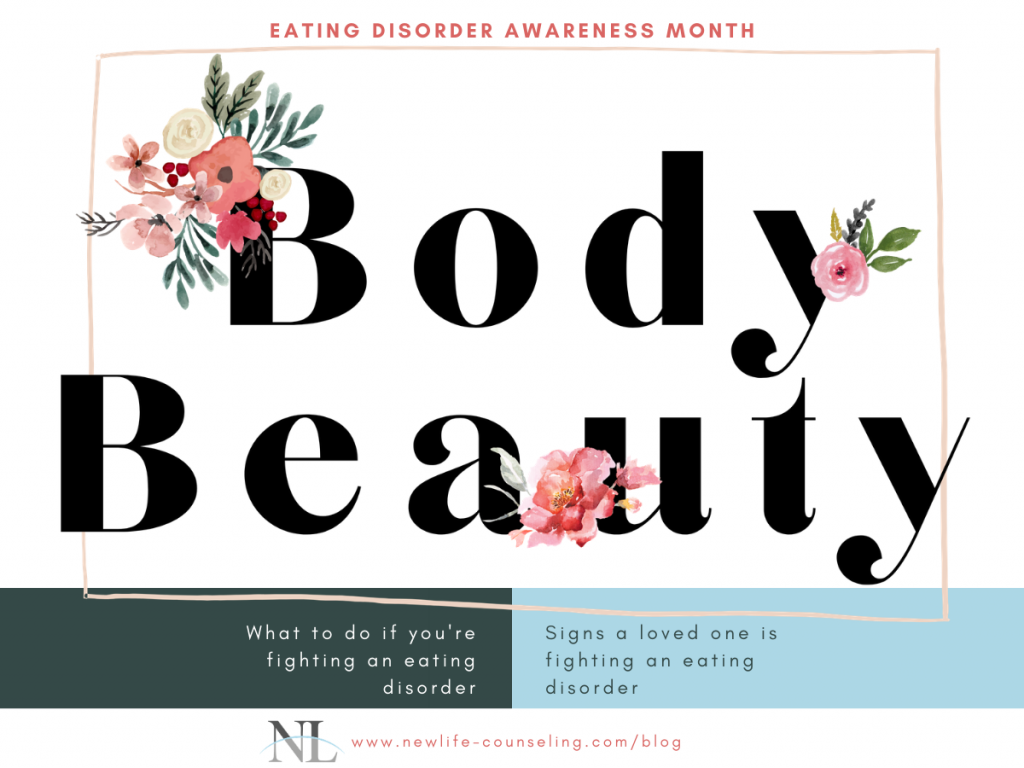Eating Disorder Awareness Month
February is National Eating Disorder Awareness and Screening Month, and it’s our mission to provide education, awareness, and empowerment to the 30 million Americans suffering from an eating disorder along with their loved ones.

Eating disorders (EDs) are complicated and often misunderstood illnesses that impact people of all ages, genders, and backgrounds. It helps to look at EDs on a continuum, instead of in a “yes or no” manner.
One way to determine if you’re dealing with disordered eating is to ask yourself, “What percentage of my day do I spend thinking about food, weight, and body image?” If the answer is, “Enough to interfere with my daily tasks and functioning,” you may have some behaviors that need attention.
Eating Disorders come in many forms, but the formal way they’re defined and determined [in accordance with the Diagnostic and Statistical Manual, Fifth Edition (May, 2013) of The American Psychiatric Association] are as follows:
- Anorexia Nervosa
- Body Dysmorphic Disorder
- Bulimia Nervosa
- Binge Eating Disorder
- Avoidant/Restrictive Food Intake Disorder
- Other Specified Feeding or Eating Disorder
- Unspecified Feeding or Eating Disorder
- Pica
- Rumination Disorder
Let’s break some of these down in simpler terms. For a full list of definitions, please visit ANAD.
Anorexia Nervosa: Not intaking enough calories resulting in a significantly low body weight. Typically, someone with Anorexia has an intense fear of food or gaining weight and will do anything possible not to risk weight gain. Like many EDs, someone with Anorexia has a difficult time identifying the seriousness of their disease and the need for help.
Bulimia Nervosa: Bulimia is characterized by recurring episodes of binge eating followed by compensatory behavior: purging, laxative use, excessive exercise, etc. Someone fighting Bulimia is obsessed with their weight and body shape and has an intense fear of weight gain, however, they feel a lack of control when bingeing.
Binge Eating Disorder: This disorder is defined by recurring binge eating episodes. An episode includes eating an amount of food larger than most people would eat within a two-hour time period while feeling they have no control over their eating.
Other Specified Feeding or Eating Disorder (OSFED): When someone meets some of the criteria for an ED but not all, they may fall into the category of OSFED.
What To Do If You’re Fighting An Eating Disorder
Battling an ED can be exhausting, frustrating, and stressful. However, it’s important you know you’re not alone and getting help (and getting better!) is possible. We’re going to list a few steps we suggest taking along your journey, however, everyone’s recovery looks a little different and it’s important to involve a medical professional and counselor along the way.
- Don’t beat yourself up or place self-blame: No one is at fault here, and the goal is recovery—not rumination.
- Build, and lean on, a supportive community: It’s easy to believe the lie you can recover all on your own, but having a supportive community of loved ones and professionals is imperative to your recovery.
- Put yourself first: If certain situations, people, or environments cause triggering events/conversations, it’s important you prioritize your own health by avoiding them.
- Recognize and believe you’re worth it: Recovery and treatment can be expensive and time consuming. However, your health and wellbeing are worth far more.
- Communicate: Talking about your illness can feel scary, but it helps those around you better understand your experience and allows you an outlet for release.
- Keep the hope: Recovery is a process, one that doesn’t happen overnight. Finding little ways to build and maintain hope along the journey will keep your spirits high and remind you why you’re fighting.
If you’re battling an ED, we want to help you find a solution that allows you to build a healthy, fulfilling life you love. Give us a call or send us an email when you’re ready—we’re excited to meet you.
Also be sure to check out this post called Controlling Our Bodies, written for us by a local nutrition counselor and registered dietician who specializes in helping those with an ED. Her body-positive approach to health is so refreshing.
Signs A Loved One Is Fighting An Eating Disorder
Identifying an ED in a loved one can be hard, especially in today’s fitness- and body-obsessed culture. It’s also a topic that can feel too personal to breech. However, if you’re concerned a loved one is battling an ED, it’s important to start a dialogue instead of ignoring the issue. Here are 7 signs a loved one is fighting an ED:
- Alteration in weight or excessive weight loss
- Obsession with body image and consistent negative self-talk
- Disruptions in eating patterns or avoidance of food
- Obsession with nutritional content or food labels
- Changes in exercise patterns or increased exercise
- Mood fluctuations and increased irritability or depression
- Misuse of laxative, diuretics, or diet pills
If you notice any of the following, start a conversation. Be open and honest but not accusatory. Take time to listen and offer support without acting as a therapist. Know your own limits and respect them.
For more tips on how to help a loved one, the ANAD has a great “Do + Don’t” graphic.
This February, join us in our fight to end eating disorders and bring healing and hope to those suffering. If you or a loved one needs individual care, we’d love to discuss your options and help connect you with the proper solution.
From the entire New Life Team, we see you, we hear you, and we stand with you.

